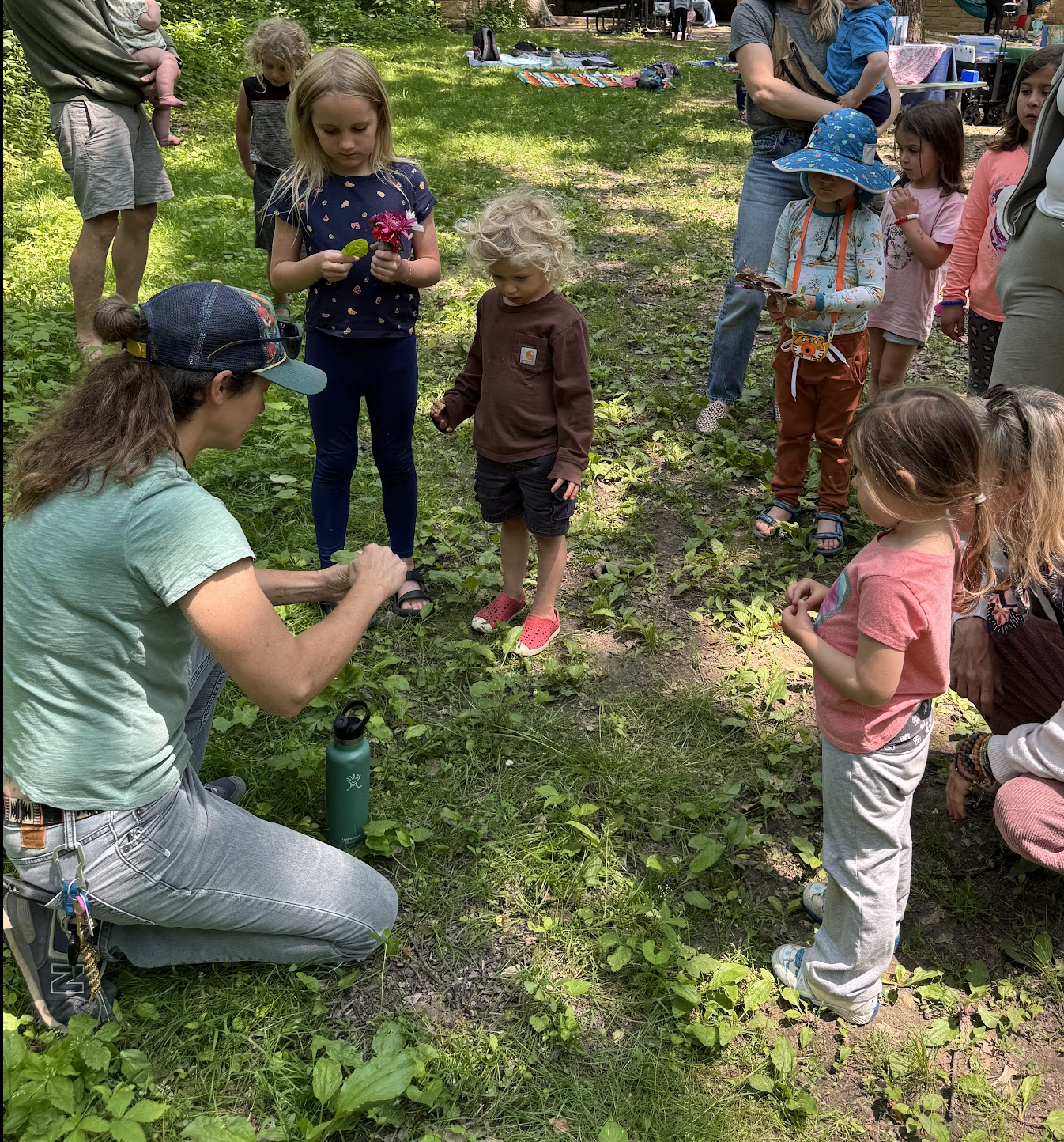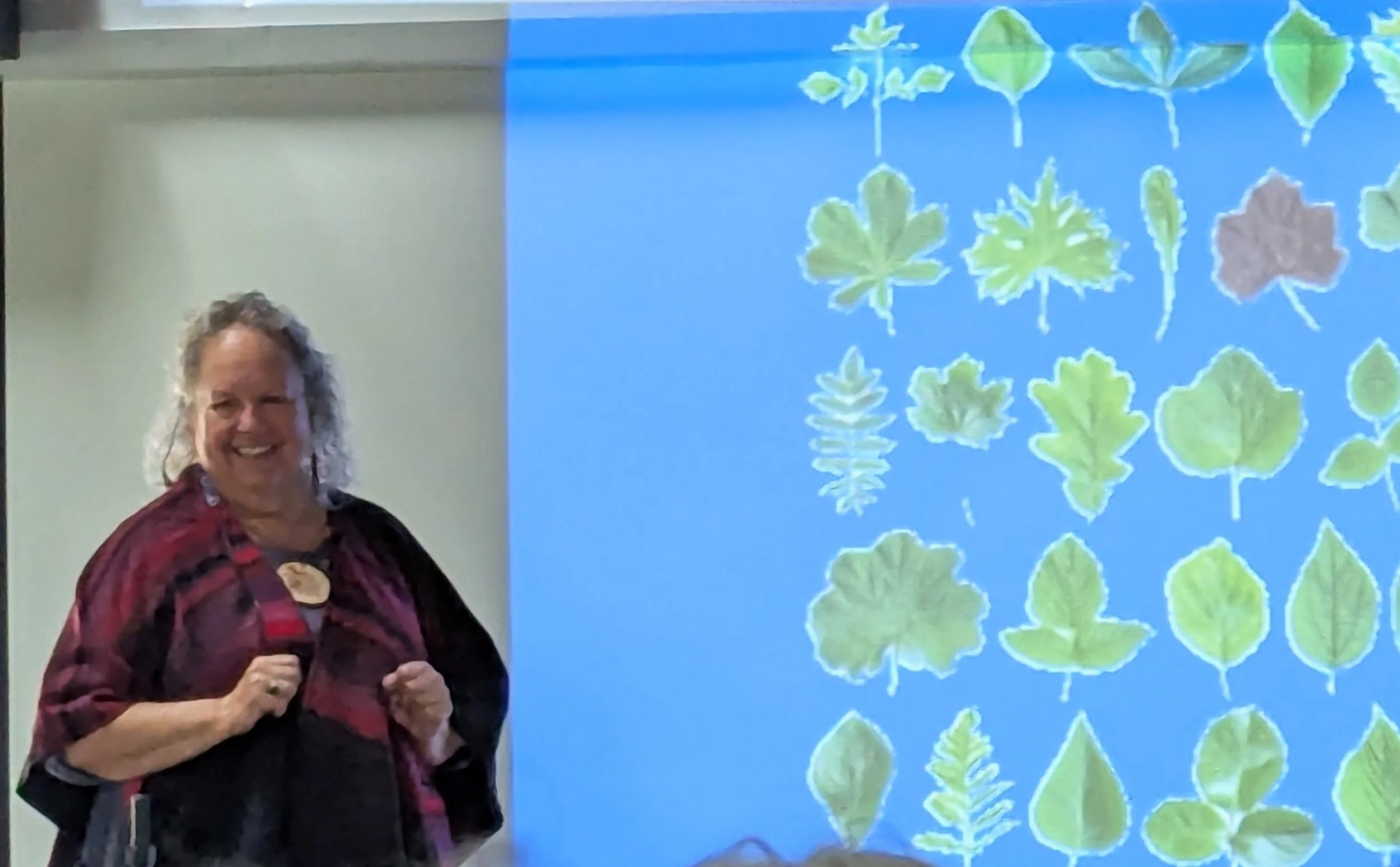IN THE NEWS:
AUGUST 2025
As a way to share what we learned from Robin Wall Kimmerer in May (see below), and extend this important way of seeing and being, we hosted a book club on her latest book, The Serviceberry: Abundance and Reciprocity in the Natural World. The book group concluded in August with moving aspirations from the members about how they will enact these principles going forward.
In four meetings held in May, June, July, and August, we discussed The Serviceberry as a group over Zoom. Book group members from at least three states spent time discussing various topics presented in this short but powerful essay by Dr. Kimmerer, such as gift economy, honorable harvest, abundance, gratitude, and reciprocity.
We had a great time together and enjoyed hearing from one another about the ways we are encountering gift economies, stretching in our generosity of both giving and receiving, and being intentional in the ways we recognize abundance. Based on feedback, we will continue the work of offering events and good reads to discuss and be in community.
To read more about honorable harvest, pick up a copy of The Serviceberry at your local bookstore.
JUNE 2025
On June 1, Children, Nature, and Us (a collaboration of environmental educators) celebrated Nature Everywhere Day by offering a chance for families to gather on the lands of the Ho-Chunk people, at Hoyt Park in Madison, Wisconsin, for free nature-based activities.
The children and their parents had fun making art from natural materials with Christi Moser from Naturing in Madison, engaging in storytime (the children were asked the different emotions they experienced within the story using pictures), and a plant walk with Ellen from Healing Roots Collaborative. On the plant walk everyone learned how to identify certain edible plants and tasted plantain, violet, and wood sorrel. They also learned how to recognize poison ivy so they can respect it by looking and not touching.
Ellen shared, “I learned a lot from this experience. I am more used to guiding adults so teaching little ones was illuminating as far as how they engage and understand different characteristics of plants. I am looking forward to future opportunities to introduce humans of varying ages to the plant world. Overall, it was a great day to be together in nature having fun, relaxing, and learning.”
On June 18, Healing Roots Collaborative presented at the ECO Madison Summit on Decolonizing Our Relationships with Nature and Ourselves.
Seventeen people attended the conversation as we sat in a circle and made recognition of our ancestors, defined colonialism, and considered our learned behaviors such as the way we walk through, think of, and relate with the natural world around us. The workshop timing allowed for just beginning the conversation, with a clear need for deeper exploration in the future.
Ellen reflected, “I had to come to terms with the limits of the moment and rest in knowing that this is an ongoing discussion that can have a lasting effect on our thoughts, actions, and even on a deep physical level. I was happy to see that there were people of several races, ethnicities, and cultures represented in this space, and we were ready to reflect on how we have all been affected by colonization in our own ways, and we were ready to face that and share about it. It was a good start.”
MAY 2025
On May 23, we attended a workshop with renowned Indigenous scientist, Robin Wall Kimmerer, the well-known author of Braiding Sweetgrass. We were incredibly inspired and learned so much from her.
Dr. Kimmerer spoke about "Gdoo–naaganinaa" or the “Dish with One Spoon Treaty” between the Indigenous nations of the Great Lakes Region where all receive nourishment from our one Mother Earth. Therefore, everyone must share, keep things clean and well-tended, and leave enough for others.
She also spoke about reciprocity, right relationship, and gift economy which is the focus of her latest book, The Serviceberry. In this photo, she was sharing about a study by the U.S. Department of the Interior (USDI) that found that the average U.S. middle schooler (ages 10-14) can identify 1,000 corporate logos but can’t ID 10 plants and animals native to their area (Note: this study is no longer available on the USDI BLM website).
Dr. Kimmerer then led us in an inquiry into the idea of an “honorable harvest” and if it had a protocol, what that might be. For example, never take the first one, which is a practice of self-restraint and respect. Ask permission. Introduce yourself first and then ask for what you need. Take only what you need, be grateful, and share what you’ve taken. She believes that if we all follow the honorable harvest, the world will last forever and this will keep the bowl full.
Robin Wall Kimmerer is a mother, scientist, decorated professor, and enrolled member of the Citizen Potawatomi Nation. She is the author of The Serviceberry: Abundance and Reciprocity in the Natural World, Braiding Sweetgrass: Indigenous Wisdom, Scientific Knowledge and the Teachings of Plants and Gathering Moss: A Natural and Cultural History of Mosses. She lives in Syracuse, New York, where she is a SUNY Distinguished Teaching Professor of Environmental Biology, and the founder and director of the Center for Native Peoples and the Environment.
MARCH 2025
A central focus for Healing Roots Collaborative in 2025 has been to connect with environmental educators in the area around Teejop, the four-lakes region of lands of the Ho-Chunk people, known as Madison, WI. Executive Director, Ellen Sims, has been meeting 1:1 with various educators who have their own businesses offering nature-based programs to children and families. In March, Ellen met in person with the broader group who collectively wanted to connect and explore possibilities for collaboration in connecting people with nature.
Members of this gathering included leaders of Outdoors We Learn (OWL), Naturing in Madison, Playful Acorns, Hike and Heal Wellness, Camp Wingra, OASIS, and Wild Harmony Nature Connection. It was a collective process focused on working together with each person bringing their own gifts and talents to serve our community and the natural world.
Ellen shared their excitement about making these connections, “We will continue to meet and further this collaboration. It was a great first step and action is already taking place. It’s such a joy to work together and not be in competition!” Healing Roots Collaborative is living into the “collaborative” part of our mission by providing structure for communication among the group. Next steps include planning a Nature Everywhere Day on June 1st for anyone who wants to come out and play, learn, and hear stories in nature. Stay tuned for more details.
Our Executive Director, Ellen Sims, attended the Marbleseed Organic Farming Conference in February 2025 and made many important connections to support the growth of Healing Roots Collaborative. One connection from Marbleseed was with a student leader from the Sustainable Lawrence University Garden (SLUG) at Lawrence University in Appleton, WI. SLUG invited Healing Roots Collaborative to help them learn how to tend their small orchard. In March, Ellen developed and offered a workshop to SLUG members on a holistic approach to honoring and caring for fruit trees.
The workshop began with taking time to honor the Indigenous peoples who were the original stewards of the land on which the SLUG garden now operates, and on which the students currently live. Gratitude was given to the people of the Menominee and Ho-Chunk Nations, with recognition of the land having been stolen from them through U.S. colonialism. Ellen shared, “It was a powerful experience and the students shared they had not done a land acknowledgement in this way before. We spoke about the interconnectedness of all the beings present, including ourselves.”
Following this practice of grounding with gratitude, the workshop included a process to clarify shared goals for the orchard, time to observe the whole ecosystem, as well as the path of the sun, and then to figure out how to prune the trees for the best outcome of all. Each person was shown the proper pruning techniques and methods for least harm and then had a chance to practice pruning.
Ellen described, “throughout our time together in the SLUG garden, we questioned, observed, and made decisions through group consensus, considering the non-human kin with whom we were relating. There were smiles and laughter throughout the workshop. I’ve never felt happier than to share these skills and orientation to relating with the natural world with young people such as those from SLUG who are incredibly thoughtful and caring.”
Ava of SLUG said after the workshop, “Ellen, thank you again for all the time you gave us yesterday and I want to let you know you left us all feeling so inspired and connected to our land! You’re an excellent and gentle teacher and I saw you inspire agency in my friends and it left me feeling so emotional. A big big thank you from SLUG!”
Healing Roots Collaborative has been asked to come back to SLUG to support continued learning and maintenance of the orchard. We are grateful for this growing collaboration!
Healing Roots Collaborative Newsletters:






